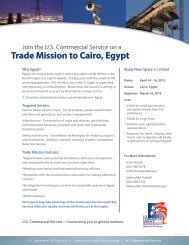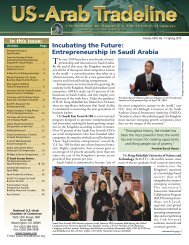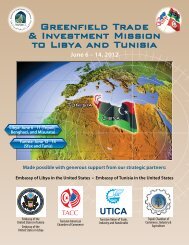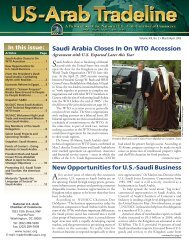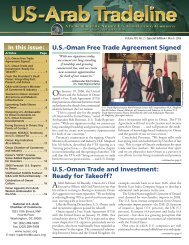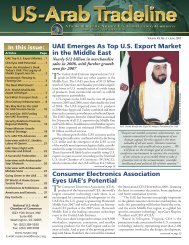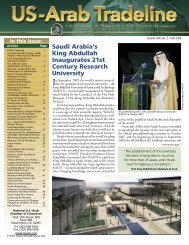Qatar - National US-Arab Chamber of Commerce
Qatar - National US-Arab Chamber of Commerce
Qatar - National US-Arab Chamber of Commerce
Create successful ePaper yourself
Turn your PDF publications into a flip-book with our unique Google optimized e-Paper software.
H.H. Sheikh Hamad bin Khalifa<br />
Al-Thani: The Visionary Behind<br />
<strong>Qatar</strong>’s Rising Star<br />
H<br />
.H. Sheikh Hamad bin Khalifa Al-Thani<br />
became Emir <strong>of</strong> the State <strong>of</strong> <strong>Qatar</strong> on<br />
June 26, 1995. Under his thoughtful leadership,<br />
<strong>Qatar</strong> has grown from a relatively modest<br />
Gulf state to one <strong>of</strong> the wealthiest and increasingly<br />
influential nations in the world.<br />
Born in Doha in 1952, Sheikh Hamad is<br />
part <strong>of</strong> a long line <strong>of</strong> Al-Thani family members<br />
who have ruled <strong>Qatar</strong> since the 18th century.<br />
He began his early education in <strong>Qatar</strong> and<br />
later attended Sandhurst Military Academy<br />
in England.<br />
Following his graduation in 1971, Sheikh<br />
Hamad was commissioned as a Lieutenant<br />
Colonel in the <strong>Qatar</strong>i Armed Forces and was<br />
appointed Commander <strong>of</strong> the first Mobile<br />
Battalion, now known as the “Hamad Mobile<br />
Battalion.” He was later promoted to the rank<br />
<strong>of</strong> Major General and appointed Commanderin-Chief<br />
<strong>of</strong> <strong>Qatar</strong>’s Armed Forces.<br />
In 1977, Sheikh Hamad was appointed<br />
Heir Apparent <strong>of</strong> <strong>Qatar</strong> and Minister <strong>of</strong><br />
Defense. As part <strong>of</strong> his military career, Sheikh<br />
Hamad oversaw an extensive program to<br />
modernize <strong>Qatar</strong>’s troops, which involved<br />
increasing manpower, creating new units,<br />
updating weaponry, and improving training.<br />
The success <strong>of</strong> his efforts was demonstrated<br />
in 1990 during the Gulf War, when <strong>Qatar</strong>i<br />
troops helped to liberate Kuwait and led the<br />
battle to recapture the Kuwaiti town <strong>of</strong> Khafji.<br />
In the 1980s, as Chairman <strong>of</strong> the Supreme<br />
Planning Council, Sheikh Hamad began to<br />
lay the foundation for a modern state by<br />
defining <strong>Qatar</strong>’s basic economic and social<br />
policies and by overseeing the development<br />
<strong>of</strong> <strong>Qatar</strong>’s abundant oil and natural gas reserves.<br />
In 1995, he assumed leadership <strong>of</strong> the<br />
nation from his father, H.H. Sheikh Khalifa<br />
bin Hamad Al-Thani. That same year, H.H.<br />
Emir Hamad and the First Lady, H.H. Sheikha<br />
Mozah bint Nasser Al-Misned, created the<br />
non-pr<strong>of</strong>it <strong>Qatar</strong> Foundation for Education,<br />
Science and Community Development. This<br />
Foundation has gone on to establish <strong>Qatar</strong> as<br />
a regional pioneer in education reform and<br />
scientific research.<br />
Three years later, the inauguration <strong>of</strong><br />
Education City underscored <strong>Qatar</strong>’s desire to<br />
lay a solid foundation for an innovative and<br />
diversified knowledge-based society. Today,<br />
Education City hosts satellite campuses <strong>of</strong> six<br />
renowned American universities and has<br />
proved to be one <strong>of</strong> the most successful<br />
experiments in education reform in the world.<br />
Also in the mid-1990s, Sheikh Hamad<br />
launched an upstart television network called<br />
Al Jazeera. Today, Al Jazeera has become the<br />
<strong>Arab</strong> world’s most influential and widely<br />
watched television channel and an essential<br />
medium for projecting <strong>Qatar</strong>’s influence<br />
around the world.<br />
In 1997, <strong>Qatar</strong> became the second country<br />
in the <strong>Arab</strong>ian Gulf to grant women the right<br />
to vote and, in 1999, municipal elections<br />
marked the start <strong>of</strong> a gradual democratization<br />
program. Voters approved a new constitution<br />
in 2003, and <strong>Qatar</strong>’s first written constitution<br />
took effect in 2005, thereby paving the way<br />
for additional democratic reforms.<br />
“The progress and high ideals<br />
we seek for our country<br />
depend on our capacity to<br />
promote and develop our<br />
educational institutions.”<br />
H.H. Sheikh Hamad bin Khalifa Al-Thani<br />
Considered one <strong>of</strong> the most effective leaders<br />
in the <strong>Arab</strong> world, Sheikh Hamad is also<br />
highly respected as a peacemaker and mediator<br />
in the international community. “We are a<br />
peace-loving nation,” commented the Emir<br />
in a recent interview with the London-based<br />
Financial Times. “We focus our attention on<br />
education, health reform and on investments<br />
– both internal and external. Our aim is to<br />
live in peace and do away with conflict. We<br />
are always ready and prepared to play a<br />
mediating role in any conflict . . . and we do<br />
not take any sides.”<br />
In 2008, Sheikh Hamad and his Foreign<br />
Minister, H.H. Sheikh Hamad Bin Jassim<br />
Al-Thani, brokered a peace agreement among<br />
the warring factions in Lebanon. This agreement<br />
is one <strong>of</strong> <strong>Qatar</strong>’s most important successes<br />
in the <strong>Arab</strong> world, resulting in a massive<br />
“victory parade” in Beirut that year that turned<br />
H.H. Sheikh Hamad bin Khalifa Al-Thani<br />
Photo courtesy <strong>of</strong> the Embassy <strong>of</strong> <strong>Qatar</strong><br />
out hundreds <strong>of</strong> thousands <strong>of</strong> cheering Lebanese.<br />
Other peacemaking efforts that have<br />
generated kudos for <strong>Qatar</strong> include: brokering<br />
a truce between Yemen’s warring factions in<br />
2007; negotiating a settlement between Sudan<br />
and Chad in 2009; and spearheading mediation<br />
efforts that led to a peace agreement<br />
between Djibouti and Eritrea in 2010.<br />
Sheikh Hamad ensures that <strong>Qatar</strong> steers<br />
a middle road politically and diplomatically,<br />
and this middle road has played an important<br />
role in that nation’s ability to serve as a respected<br />
broker and mediator. <strong>Qatar</strong> is less equivocal,<br />
however, when it comes to safeguarding the<br />
country’s strategic and economic interests. In<br />
this regard, Emir Hamad is one <strong>of</strong> America’s<br />
most steadfast friends in the region.<br />
Noting that <strong>Qatar</strong> has become an international<br />
leader under the thoughtful policies<br />
<strong>of</strong> Sheikh Hamad, U.S. Secretary <strong>of</strong> State<br />
Hillary Rodham Clinton said in December<br />
2010 that the “relationship between our two<br />
nations has grown stronger and more dynamic<br />
over the past few years as <strong>Qatar</strong> and the United<br />
States work together to build a future that is<br />
more peaceful, more prosperous and more<br />
secure for all our people.”<br />
In the 16 years that he has served as Emir,<br />
Sheikh Hamad has launched significant<br />
political, economic, and educational initiatives<br />
that have transformed <strong>Qatar</strong> into one <strong>of</strong> the<br />
most stable and progressive nations in the<br />
region. A capstone <strong>of</strong> this leadership came in<br />
December 2010, when <strong>Qatar</strong> was selected to<br />
host the 2022 World Cup. This was the first<br />
time ever for an <strong>Arab</strong> or Islamic nation to win<br />
this honor, further enhancing the rising star<br />
that is <strong>Qatar</strong>.<br />
<strong>US</strong>-<strong>Arab</strong> Tradeline • Spring 2011 3



